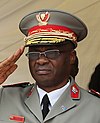The Armed Forces of the Democratic Republic of the Congo is the state organisation responsible for defending the Democratic Republic of the Congo. The FARDC was rebuilt patchily as part of the peace process which followed the end of the Second Congo War in July 2003.
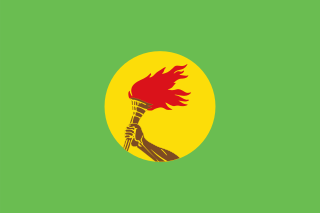
Zaire, officially the Republic of Zaire, was the name of the Democratic Republic of the Congo from 1971 to 1997. Zaire was located in Central Africa and was, by area, the third-largest country in Africa, and the 11th-largest country in the world. With a population of over 23 million inhabitants, Zaire was the most populous officially Francophone country in Africa, as well as one of the most populous in Africa.

Mobutu Sese Seko Kuku Ngbendu wa za Banga, commonly known as Mobutu Sese Seko or simply just Mobutu and also by his initials MSS, was a Congolese politician and military officer who was the 1st and only President of Zaire from 1971 to 1997. Previously, Mobutu served as the 2nd President of the Democratic Republic of the Congo from 1965 to 1971. He also served as the 5th Chairman of the Organisation of African Unity from 1967 to 1968. During the Congo Crisis, Mobutu, serving as Chief of Staff of the Army and supported by Belgium and the United States, deposed the democratically elected government of left-wing nationalist Patrice Lumumba in 1960. Mobutu installed a government that arranged for Lumumba's execution in 1961, and continued to lead the country's armed forces until he took power directly in a second coup in 1965.

Étienne Tshisekedi wa Mulumba was a Congolese politician and the leader of the Union for Democracy and Social Progress (UDPS), the main opposing political party in the Democratic Republic of the Congo (DRC). A long-time opposition leader, he served as Prime Minister of the country on three brief occasions: in 1991, 1992–1993, and 1997. He was also the father of the current President, Felix Tshisekedi.
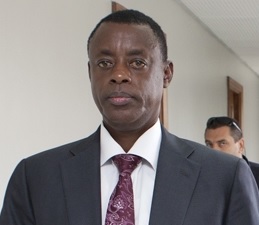
James Kabarebe is a Rwandan retired military officer who has served as a Senior Presidential Adviser on security matters in the government of Rwanda, since 19 October 2018.

Antoine Gizenga was a Congolese (DRC) politician who was the Prime Minister of the Democratic Republic of the Congo from 30 December 2006 to 10 October 2008. He was the Secretary-General of the Unified Lumumbist Party.
The Agence Nationale de Renseignements (ANR) is a government intelligence agency of the Democratic Republic of the Congo (DRC). The role of the agency is to ensure "internal security and external security" of the state. The agency was strongly criticized for the disrespect of human rights by several organisations. Inzun Kakiak has led the agency since 2019.

Law enforcement in the Democratic Republic of the Congo has historically been focused on furthering the state's aims with no regard for human rights. The Police nationale congolaise is the police throughout the territory of the Democratic Republic of the Congo. It was composed of between 110,000–150,000 officers as of 2010.
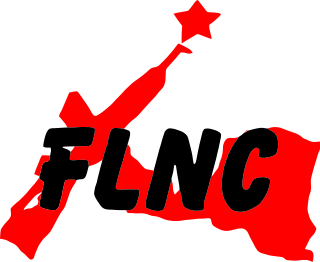
The Congolese National Liberation Front is a political party funded by rebels of Katangese origin and composed of ex-members of the Katangese Gendarmerie. It was active mainly in Angola and Zaire during the 1970s.

The Republic of the Congo was a sovereign state in Central Africa, created with the independence of the Belgian Congo in 1960. From 1960 to 1966, the country was also known as Congo-Léopoldville to distinguish it from its northwestern neighbor, which is also called the Republic of the Congo, alternatively known as "Congo-Brazzaville". In 1964, the state's official name was changed to the Democratic Republic of the Congo, but the two countries continued to be distinguished by their capitals; with the renaming of Léopoldville as Kinshasa in 1966, it became also known as Congo-Kinshasa. After Joseph Désiré Mobutu, commander-in-chief of the national army, seized control of the government in 1965, the Democratic Republic of the Congo became the Republic of Zaire in 1971. It would again become the Democratic Republic of the Congo in 1997. The period between 1960 and 1964 is referred to as the First Congolese Republic.
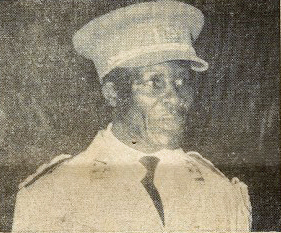
Justin Kokolo-Longo was a Congolese military officer who briefly served as deputy chief of staff of the Armée Nationale Congolaise.
Louis de Gonzague Bobozo was a Congolese military officer who served as commander-in-chief of the Congolese National Army from 1965 until 1972.

Army General Célestin Mbala Munsense is a Congolese military officer who has served as the Chief of Staff of the Armed Forces of the Democratic Republic of the Congo (FARDC) since 14 July 2018. He is considered a loyalist of President Joseph Kabila and held a number of high ranking posts in the presidential and military administration prior to his appointment, replacing Army General Didier Etumba as Chief of Staff of the Armed Forces. Before that, he was a long time Chief of Staff to the President's office, since at least 2010, as a brigadier general. In September 2014, during Kabila's restructuring of the army, Mbala was a major general and was appointed as Deputy Chief of Staff for Administration and Logistics.
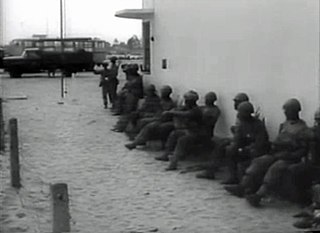
On 5 July 1960, soldiers of the garrisons of Léopoldville and Thysville of the Force Publique, the army of the newly independent Republic of the Congo mutinied against their white officers. The revolt quickly spread throughout the Bas-Congo and engulfed the country in disorder, beginning the Congo Crisis.
Sizarail was a railway company formed by foreign investors that briefly operated the railway network in Zaire between 1996 and 1997. It took over from the state-owned operator in an attempt to revive the railway, which had virtually ceased to operate despite being a critical source of revenue from mineral exports. Operations quickly improved, and the company earned a small profit in the first year. However, advancing rebel forces closed it down and re-nationalized the railway.
André Kisase Ngandu was a Congolese rebel leader. An insurgent in the Simba rebellion of the 1960s, he immigrated to East and later West Germany where he lived for many years. He resumed his rebel activity with Ugandan support in the 1990s and emerged as leader of the National Council of Resistance for Democracy (CNRD) which waged an insurgency in eastern Zaire.
Eluki Monga Aundu was a Congolese military officer who achieved the rank of general.

DR Congo–France are the bilateral diplomatic relations between the Democratic Republic of the Congo and France. Both nations are members of the Organisation internationale de la francophonie and the United Nations.
The Mémorial du Soldat Congolais, also known as the Congolese Soldier Memorial, is a 3-meter-tall memorial located at the FORESCOM Roundabout in the Gombe commune of Kinshasa in the Democratic Republic of the Congo (DRC). The monument serves as a national tribute to the Congolese soldiers who fought and made the ultimate sacrifice throughout the country's tumultuous history, spanning from 1885 to the present day. Inaugurated on July 28, 2017, by former President Joseph Kabila, the monument was designed by Van Ntoto of Anko Design Corporation and constructed by a Congolese monumental sculptor, Christophe Meko Disengomoka. The memorial symbolizes remembrance, honor, and patriotism, providing visitors with a space to reflect on and pay tribute to the fallen soldiers who played a significant role in the nation's history.

The Battle of Kisangani took place in March 1997 during the First Congo War. The rebels of the Alliance of Democratic Forces for the Liberation of Congo (AFDL), supported by the Rwandan Patriotic Front, took the city defended by the Zairian Armed Forces (FAZ) which was loyal to President Mobutu Sese Seko.









